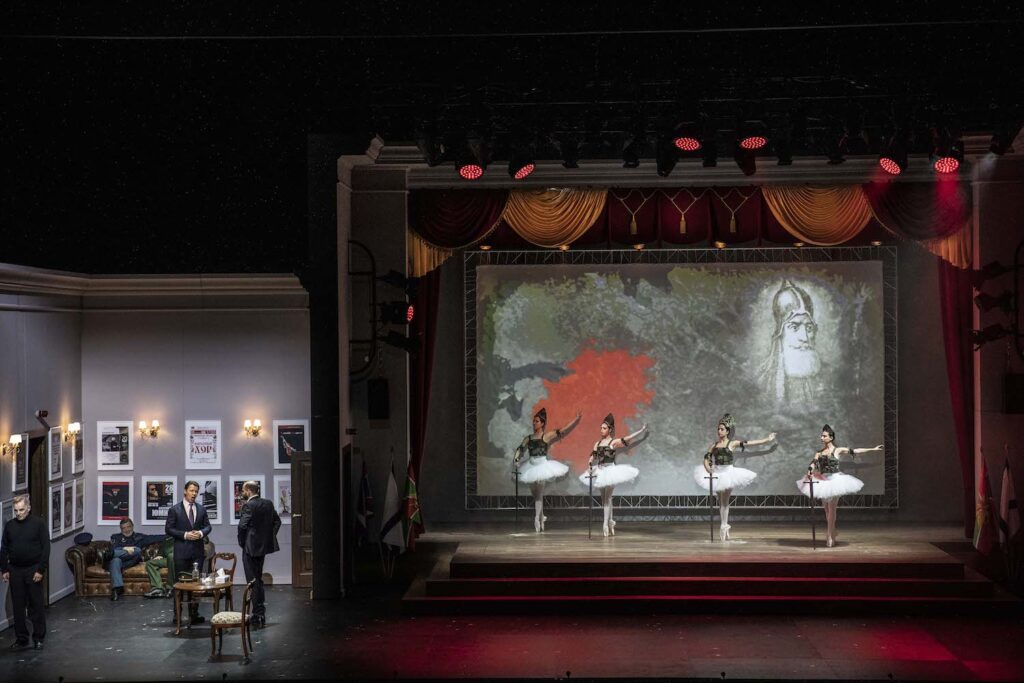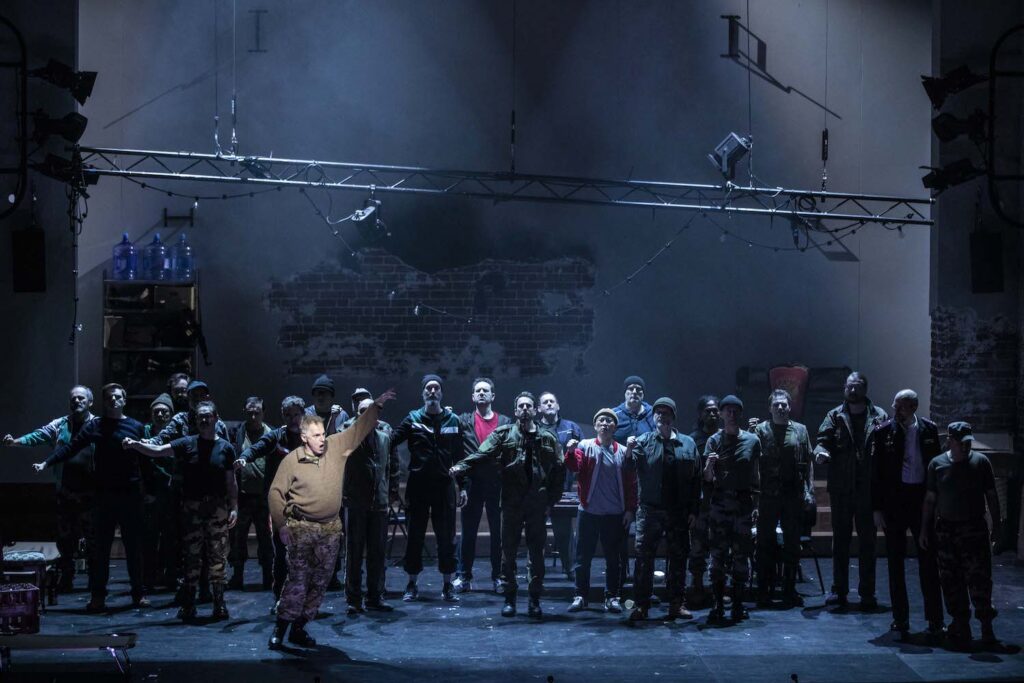The Russian Avant-garde has attacked Lyon, Pique Dame is left in ruin!
Enfant terrible (now forty years old) Russian avant-gardiste stage director Timofeï Kouliabine fled Russia in protest of its invasion of Ukraine. He had been director of Novossibersk’s progressive Theater of the Red Flame, and surely he escaped with much of its fervent avant-gardism. Mr. Kouliabine took his opening night bow “en culottes” (the pants of the 18th century French aristocracy), though with bare, hairy calves showing — surely a protest of something, perhaps the civility of a French theatre.
His production team is firmly ensconced in current Russian theater. Dramaturg Ilia Kukharenko, a former editor of Vogue Russie and Madame Figaro Russie, is now a commissioner of the Golden Mask theater awards of Moscow’s Pushkin Fine Arts Museum. Set designer Oleg Golovko, a frequent collaborator of Mr. Kouliabine, is the recipient of many awards within the Saint Petersburg theater community. Costume designer Vlada Pomirkovanaya, a frequent Kouliabine collaborator as well, has a plenitude of design credits in Moscow and Perm. Lighting designer Oskars Paulinš works at Moscow’s Pushkin and Gogol theaters.
Never mind Tchaikovsky’s Pique Dame (1890), or Pushkin’s novella Pique Dame (1834) on which the opera is loosely based. Just now in 2024 Lyon Kouliabine and his collaborators had other fish to fry. Though I am not sure what all those other fish were.
They recast this nineteenth century document of Russian aristocratic depressive boredom onto a stage that sat on Lyon’s opera house stage (story within a story) where present day nasty things happen, though Tchaikovsky’s grandiose second act Polonaise was portrayed as a costume ball, rudely interrupted by an electricity outage. It was complicated.

The first scene of the first act, Tchaikovsky’s Moscow park, was set in a tiny vestibule of this stage set theater. Its expansive stage however held act after act of Russian militarism — a war widows’ dirge, Swan Lake ballerinas with Kalashnikovs, crippled veterans, etc. All this outrage grandly suffocated our getting acquainted with Hermann and his gambling obsession, off to the side.
At the end of the opera we returned to this obscure theatrical metaphor, though now the stage (on the stage) is in grandly distressed ruin (we sat in long silences for the intra act scene changes). We were anticipating the famed suspense of the card scene. The dissolute inhabitants were however in no condition to attempt any organized activity, much less able to find the mental acuity to gamble. Instead Hermann’s rival in love, the Prince Eletsky, presented himself, he then dressed himself as the Countess. Hermann shot him as the Pique Dame dead, escaping his own Pushkin/Tchaikovsky suicide.

Go figure.
Lisa’s magnificently bleak Tchaikovsky suicide was subverted as well. She sat in a gloomy train station together with various contemporary, societal victims. At the scene’s climax, rather than throwing herself in front of a train or bus, she gathered a mother and child and fled, presumably to a waiting train.
It is possible that this willful destruction of an operatic masterpiece was a selfish celebration of Mr. Koullabine’s escape from Russia, or maybe it was the deliberate destruction of an operatic masterpiece mimicking Russia’s willful destruction of Ukraine. Whatever, it seemed and was very Russian.
The Hermann was Russian tenor Dmitry Golovnin. He is a character singer, missing the voice and presence of a leading tenor. Mr. Goloynin is a fine singer indeed, holding forth forcefully and magnificently (he is a former trumpeter) through each of the opera’s seven scenes, though not in a voice that can be termed as beautiful. Perhaps his role was intended to be understood as Everyman, not merely that of a besotted opera singer who could summon our participation (cartharsis) through the vocal magnificence of his situation. (See lead photo from Act III, train station.)
Lisa was sung by Russian soprano Elena Guseva. Mme. Guseva is very able performer, singing Russian heroines on many of Europe’s important stages — as well she was a recent Lyon Tosca. Just now in the Kouliabine Pique Dame she was required to go histrionically well outside the vocal formalities of the role, robbing her of any empathy we might feel for the young heroine she was asked to portray. Vocally it was a fine performance, though we did not feel her participation in Mr. Koullabine’s storytelling, whatever it was. (See lead photo, Act III, train station.)
The Countess, Lisa’s grandmother, the “Pique Dame” was sung by Russian mezzo soprano Elena Zaremba. The role was enacted to perfection. Russian baritone Pavel Yankovsky sang the Count Tomski. Former member of the young artist program at the Bolshoi Opera Konstantin Shushakov was the beautifully voiced Prince Eletski. Ukrainian mezzo soprano Olga Syniakova was the beautifully voiced Pauline.
The final prayer as sung by the male voices of the Opéra national de Lyon was of exceptional beauty.
Conductor Daniele Rustioni seemed to embrace Mr. Koullabine’s production, but never found a musical center for it.
Michael Milenski
Opéra Nouvel, Lyon, France. March 16, 2024